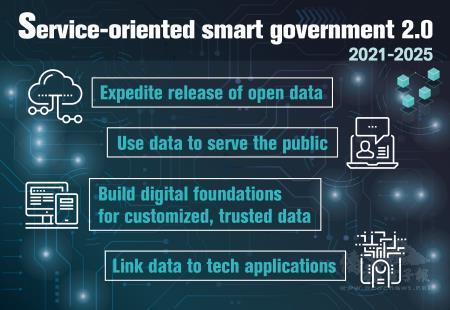
As governments the world over promote digital services, Taiwan, for its part, is working to boost its digital competitiveness. As part of the Digital Nation and Innovative Economic Development Program (2017-2025), Taiwan in 2017 launched a service-oriented smart government program (2017-2020) that has already yielded demonstrable results in the development of interdisciplinary and comprehensive one-stop services and the creation of diverse collaborative environments. In 2021, the government will roll out a second iteration of the service-oriented smart government program (2021-2025), which aims to improve smart governance capabilities through the use of open data, encourage the development of diverse applications by the private sector, and promote the creation of a data economy. The program will strengthen all aspects of smart governance with the objective of meeting the needs of the people.
Key components of the program
■ Improve interagency services: Strengthen digital services for everyday uses, simplify application submissions and procedures for the public, and enhance user experiences and services through smart applications. Employ emerging technologies to bolster public trust in the government, and make use of different types of personal identification technologies. Create interagency services available completely online, and utilize data to provide services customized to the individual.
■ Expedite the release of open data: Establish principles concerning requests and authorizations for usage of government data, and the collection of fees thereof. Make data available for public searches, and provide guidance mechanisms. Release more high-value data collections, institute procedures for data reuse, and enable data exchanges across domains. Assign priority to promoting databases relating to common services such as mass transportation and financial products.
■ Promote evidence-based decision making: For the purpose of solving problems commonly confronted by citizens, use data analytics in the identification of decision-making gaps, policy implementation bottlenecks, and the focus of public opinion. Use analysis models and algorithms on data linked across agencies and operations to provide the government with assistance in decision-making processes and formulation of governance actions.